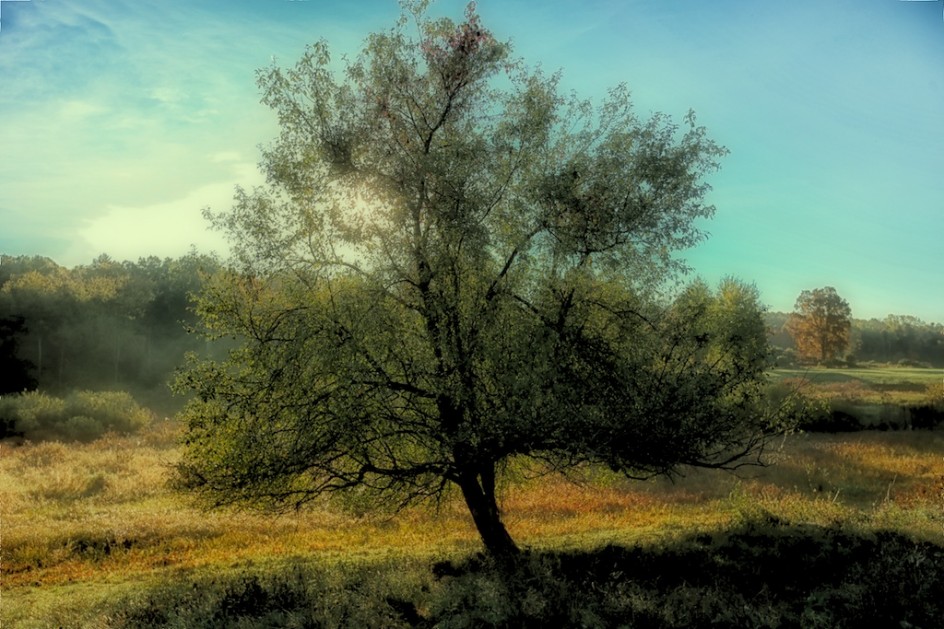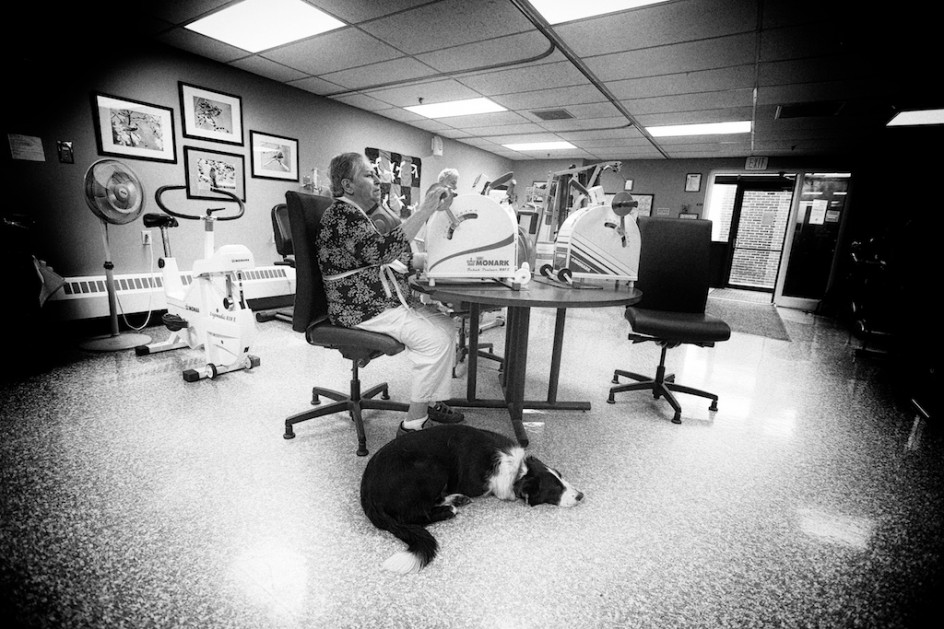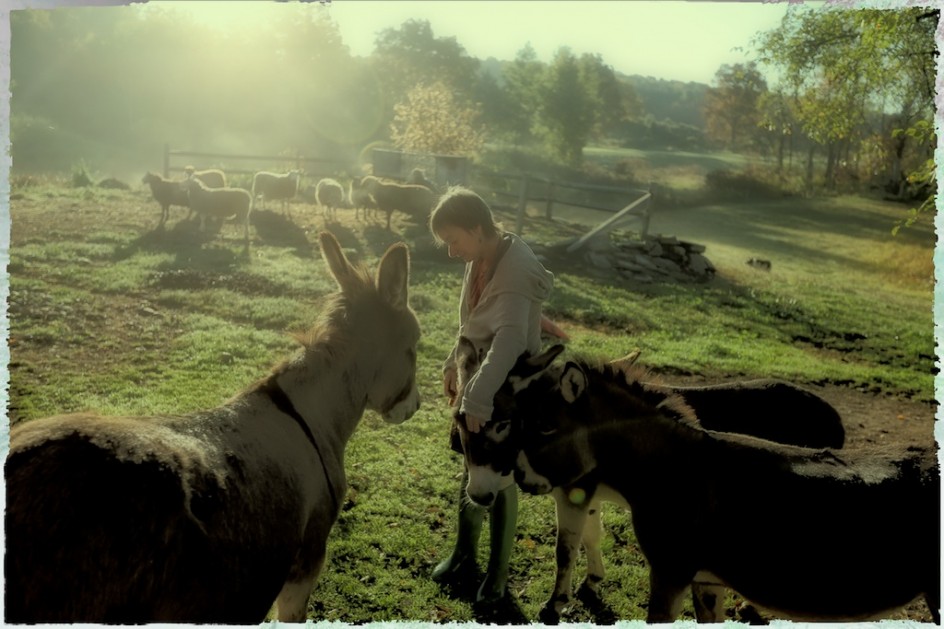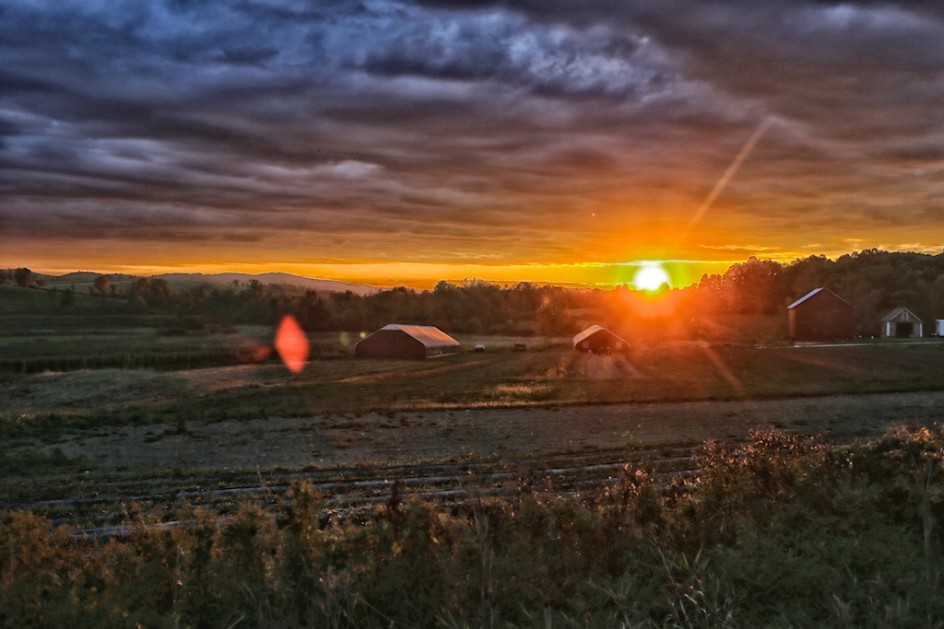
Day: October 3, 2014
Cardiac Rehab: Red And Dot

Dot rarely speaks in cardiac rehab. When we enter, our blood pressure is taken and a heart monitor is strapped on each one of us, we can, if we wish, look up on a screen and see our heart rate projected. If it moves sharply up or down, Patty or Robin will appear instantly and check on us. Dot moves slowly, she begins work on the Monark arm strength machine, we sit at it for as long as we can and turn handles that resist us. It is challenging.
It is a struggle for Dot to put her jacket on or take it off. She never complains.
Red has decided to keep an eye on Dot. The two have become inseparable in cardiac rehab. He lies by her feet when she uses the Monark machine, then moves to the mat when she gets onto the stepper, a kind of stationary bicycle. I see Dot turn to Red every now and then and she will smile at him. “He likes me,” she whispered to me today. He does, I said. And he does. He watches over her as well, he accompanies her.
Red is always aware of me, keeps an eye on me, but I am not needy there, I move from machine to machine quickly. Red responds to attention and need. When Dot arrives, she looks for him, and the smile on her face brightens the room and the day. When she sits down to rest, Red comes over to put his head in her lap, and she pets him, slowly and deliberately. When she leaves, she bends over as far as she can to pat him on the head and say goodbye. I have given her two photographs of her and Red, she asked for the second one so her granddaughter could see it. I am hoping Dot can come to the Open House to see Red work the sheep.
I love watching the two of them, it makes time rush quickly by for me in cardiac rehab. Theirs is an almost totally silent and unspoken relationship. Dot does not talk baby talk to Red, or coo at him or exclaim how wonderful he is. But their love is quite evident, we all see it. They simply have connected and, in cardiac rehab, work together.
The Rights Of Animals

This week, the World Wildlife Fund released a chilling survey showing that half of the animals in the world have disappeared since 1970. The report did not interrupt the squabbling in Washington, or the violent videos pouring through the Internet, not even for a minute. For animal lovers like me, it was major news, another wake-up call for us to consider what we are doing to animals, and to the planet they depend on for their existence.
A century ago, the naturalist Henry Beston (Outermost House) called upon human beings to find a wiser and more mystical understanding of animals. In his time, animals were still plentiful, the idea that human beings might drive them from the earth, or that climate change would kill off countless species had not yet occurred to anyone. His plea is much more urgent today than it was even then. Animals that are not pets are disappearing from the world at a much more rapid rate than was previously believed.
Beston’s book helped spark a new movement, it called itself the animal rights movement, and a century later it has become clear that the movement – I believe he would have hated it – has not developed a clear notion for the rights of animals beyond not abusing them, and removing them from contact with most people.
Stopping the abuse of animals is a good thing, but it is a different thing to consider and embrace genuine rights for them. Many animal lovers abhor the term “rights” for animals and prefer the idea of animal “welfare” instead. They argue that animals ought not be afforded human notions of rights, rather they need to be given protections and treated well. I believe animals are entitled to rights, but I would not define these rights in the way animal rights groups like PETA or the newly-politicized U.S. Humane Society and A.S.P.C.A. now do. None of these organizations has anything resembling a vision for keeping animals in our world and helping the people who own, live and work with them.
I have been thinking about the rights of animals for some time, especially since I’ve been writing about the New York Carriage Horses. What, I wonder, would genuine rights for animals be, beyond issues of abuse, rescue and mistreatment?
– Animals have the right to survive in the world. Human development, greed and arrogance are killing many, according to the WWW, climate change and global warming killing many more. If New York City can accommodate trucks, buses, giant office buildings and condos, it can make room for the horses, also citizens of New York. The right of animals needs to be codified and protected from human development, it is becoming clear that there will be few, if any animals in the world unless they are protected from the deprivations of people. In this context, the New York Carriage Horses could not be banished from New York, the city would have to provide accommodations that kept them in the city, safe, healthy and present among us.
– The rights of animals can only be protected if the rights of the people willing to live, work and be with them are also considered and protected. People who own animals – circuses, carriage drivers, pony ride providers, farmers, animal lovers – need help and support keeping animals. People have the right to adopt dogs and cats, even if they work and are not wealthy. Farmers who struggle to care for their animals need assistance in order to care for their animals properly, this would eliminate more neglect and suffering than a million raids and protests.
– Animals will never be accorded broad rights or protections without the support and consent of vast numbers of human beings – as the New York Carriage Horse controversy demonstrates, the animal rights movement there is widely disliked and disregarded. People must not be alienated by an animal rights movement, it must be credible and moderate, they must be drawn to it and welcomed.
– People have the right to live among animals, animals have the right to live among people. Animals that have no connection with human beings, that cannot work with or for them, that have no meaning or function, are disappearing from the world at a horrific rate. It is simply not enough to say that animals should return to their natural environments when these environments are disappearing at a staggering and accelerating rate. Animals cannot survive and thrive in the world without people, we cannot be separated from them or despised by the people who advocate for them.
– We need a wiser and more mystical understanding of animals beyond rescuing them from human beings, beyond animals that are pets. This is far too narrow a prism to really protect them and integrate them into our world, as the WWW fund clearly demonstrates. The animal rights movement has not made animals safer or kept them alive, it is simply institutionalizing them, removing them from homes and cities and businesses and people and public institutions and events and segregating them in zoos, private preserves and the homes of the wealthy. When they disappear from our sight, they vanish also from our consciousness.
Animals have the right to be understood as they are – we need to grasp the real lives of real animals – they must not be exploited for the emotional benefit of muddled and needy human beings.
– Animals ought not ever exist for the purpose of promoting hatred and abuse upon human beings, or exploited for the purpose of battering people. The culture of the animal rights movement has become viscerally and intrinsically hostile to people – it has almost become it’s purpose, the movement has literally become synonymous with hatred, cruelty, ignorance and self-righteousness. That is a tragedy for animals, the very mention of animal rights has become polarizing.
The leader of one of the animal rights movements in New York seeking to ban the horses has repeatedly told reporters that the horses are lonely, suffering because they do not eat their meals together, and are sad because their heads are down when they stand in carriage lines. These sadly ignorant statements have never been challenged by the journalists who repeat them, they are false according to the testimony of every reputable or knowledgeable animal lover, horse lover, veterinarian or behaviorist. Animals have the right to have their fate and future determined by people and officials who know and understand them, their lives should not be sacrificed to human fantasy, rage, projection and emotionalizing.
– There is a mystical side to animals, we understand little about them, for all of our arrogance and anthropomorphizing. They are not like us, they are not our dependents, wards, equals. They are of another world and we need to understand them before claiming to decide their fate.
The idea of animal rights is complex. I want to write more about the urgent need for true animals rights in the coming weeks and months, but the World Wildlife Fund has reminded me that it is time for animals to be given real rights, before it is too lalte.
White Creek Sunset
“Saving Simon” – Saving The Donkey, Saving The Book

People are asking me what’s going on with my book on Simon, “Saving Simon,” out next Tuesday, and I realized I haven’t been totally candid about it. I don’t care for struggle stories. But I need to be forthcoming, for the sake of me, Simon’s story and my book.
I am committed to being honest and open on the blog, it is how I work things out:
“Saving Simon” is my 27th book, and it is the first of my books to be “orphaned” by my publisher. This isn’t a lament or a complaint, just the truth. I decided last year to switch publishers – after 30 years, I am leaving Random House for Simon & Schuster.
I have been around publishing long enough to know what happens when a writer leaves a publisher before a book comes out – they refer to the book as being “orphaned.” An agent friend told me: “if you think they didn’t do much before, wait until you see what happens when you leave.” He was correct.
I understood this when I made the decision to leave – it was time – and I am nothing but grateful to Random House for publishing my books my whole life. They did a good job. Still, the publication of this book is a new, even unprecedented experience for me. No book tour, no publicity, no money budgeted to send me to a single book store anywhere. This has never happened to me.
Every year for decades, fall meant book tour, an intense month or so of interviews, travels around the country, reviews all over the place, radio shows. It was an extraordinary experience, the way a book is introduced to the wider world.
This year, the great sound of silence, a great indifference. I have some interviews on Tuesday, the pub date, then nothing. I am doing a talk and reading at Battenkill Books next Tuesday and readings at the Northshire Bookstore in Saratoga and Manchester, Vt. Anything else I will have to do myself, and there’s a lot at stake. How will people even know the book is out?
There was not a single dollar budgeted for my book tour by my life-long publisher. I admit to being a bit stunned, I should have been prepared but am often naive. Lots of writers have it a lot worse than me. My book tour schedule used to be the size of a small book, my tours took me all over the country, to many great bookstores. This book tour schedule is three paragraphs.
I got sad and angry about this last week, fell into a funk – I love the Simon story and the book and it is hard for me to see it – and me – cast aside like this, it took years to write and is an important story about animals and compassion, the first reviews have been wonderful. Reviews don’t seem to matter much any more, it’s word of mouth online that sells books.
It’s always possible I’m just not facing reality – perhaps I’m over, another mid-list writer wrestling with change and denying reality, like an aging movie star. But I don’t think so. I have never felt stronger or clearer as a writer, or more creative. In a sense, I feel my best writing is just getting underway. And I am excited about my new book contract with Simon & Schuster and they are excited about me. They are already planning my next book tour.
This orphaned book is a condition of my own making, I am responsible for it. I didn’t have to switch publishers (except I did, truly). I am well aware that publishing has changed, been corporatized like media and music and movies, and it is all about dollars and cents, as most corporate things are.
So what, I asked myself, am I going to do about my book? Am I going to be just another writer whining and bitching about Amazon, e-books and his publisher, or am I going to respond to my book being orphaned in a positive and creative way? A real test of my notions about new media, individuality, a true test of the blog, another evolution in my extraordinary relationship with my local bookstore, which has ordered 1,000 copies of “Saving Simon” already.
One of the things I love about my books now is that my bookstore is as much a part of the experience as I am. Connie sells a ton of my books, she also makes a lot of connections with people who love the idea of the bookstore, miss theirs, or want to keep a great one going. People all over the country order their books from Battenkill now, they are so classy, so nice. This year, Battenkill will be more important than ever to me, I will almost certainly sell more books there than anywhere else. What a wonderful thing (And they take Paypal.).
So I am going to fight for my book, I can’t stand by and see the story of Simon orphaned. The term abuse is tossed around casually these days – I think of the New York Carriage Horses – but Simon reminds us what it really means. And how powerful and inspiring the spirits of animals can be. Simon fought to live and heal from the first day, he fights still. And this reality connects the story of Simon much more closely to me – we are being orphaned together, a donkey who was cruelly abandoned, a writer whose book has been orphaned as well. I have to admit, it’s a good story, a continuation of the story.
Simon and I both travel in the theater of chance together, as men and donkeys always have.
Suddenly, the thing takes on a whole new meaning. I mean to convert this experience into something positive, something creative, something affirming. Simon answered his call to life, I am answering mine. I can bray too, I do it every day, right here.
I am not letting a book of mine vanish into the marketing either of 2014. I am putting together my own “Saving Simon” campaign, on the blog, on my Facebook Page. I will set up some readings by myself, and travel to some bookstores on my own hook. Simon and I have been on a great journey together – this is sort of the point of the book – and the publication of the book is another and seminal part of the trip.
To start, I am shooting for 2,000 books sold at Battenkill Books (518 677-2515) or online. I hope to even farther. I will sign and personalize any books sold there. I will be giving stuff away on my blog and social media pages – coupons for pet food, notecards, postcards, potholders, photos. I will go where I have to go, do what I have to do.
Next year I will have a different publisher, a different reality. But I won’t quit on this book or on the story of my remarkable, loving and very brave donkey. Simon never gave up on life, neither will I.

